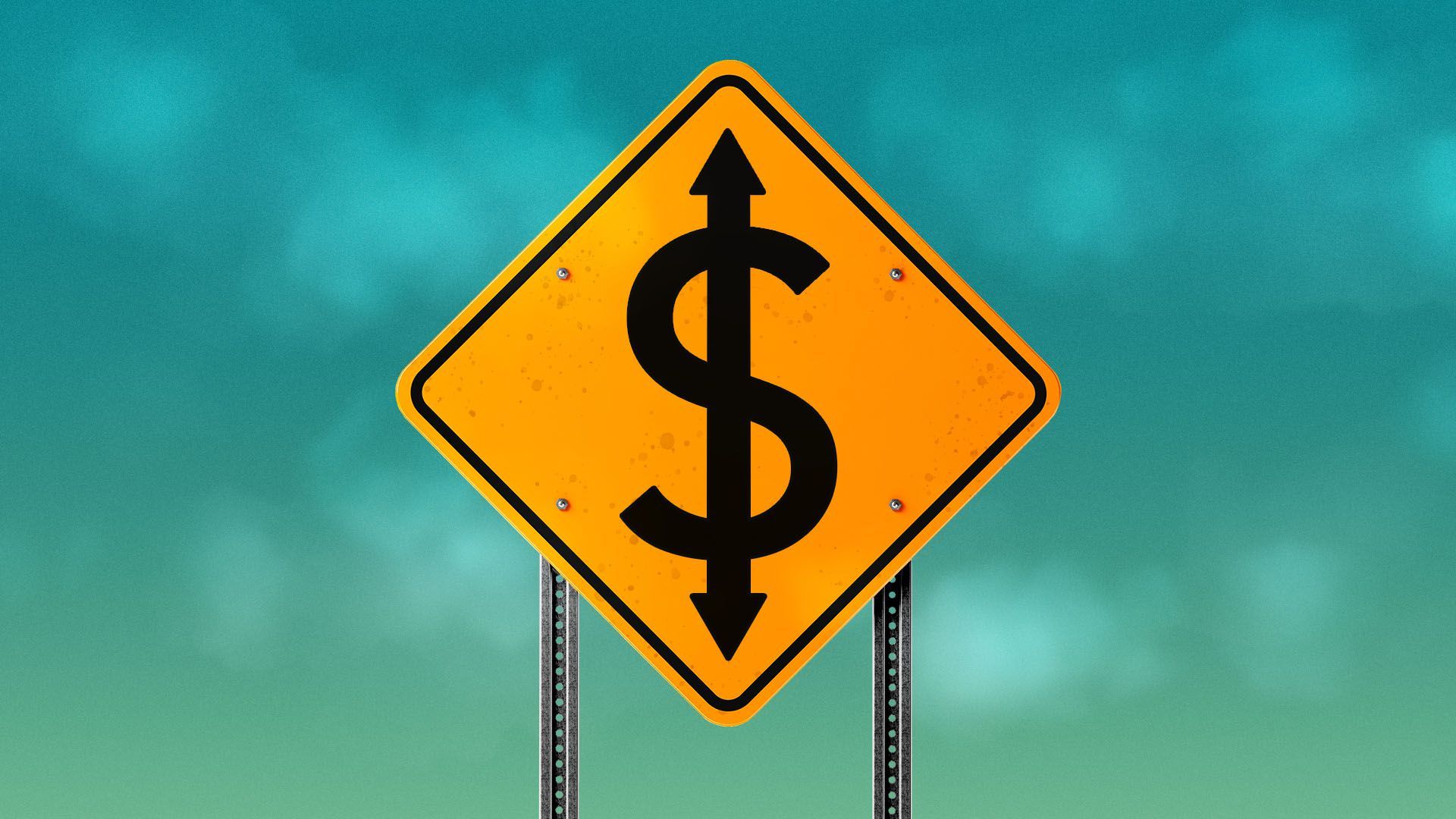| |
| |
| |
| Presented By DiversyFund |
| |
| Axios Markets |
| By Dion Rabouin ·Jan 19, 2021 |
| Happy start to the shortened week! Was this email forwarded to you? Sign up here. (Today's Smart Brevity count: 1,179 words, 4.5 minutes.) 🎙 "Rarely do we find men who willingly engage in hard, solid thinking. There is an almost universal quest for easy answers and half-baked solutions. Nothing pains some people more than having to think." - See who said it and why it matters at the bottom. |
| |
| |
| 1 big thing: Biden's inflation danger |
 |
|
| Illustration: Sarah Grillo/Axios |
| |
| President-elect Joe Biden's $1.9 trillion stimulus proposal has economists and bullish market analysts revising their U.S. growth expectations higher, predicting a reflation of the economy in 2021 and possibly more booming returns for risk assets. - But others are warning that what's expected to be reflation could actually show up as inflation, a much less welcome phenomenon.
On one side: Economists at Goldman Sachs raised their 2021 U.S. GDP forecast to 6.6% — a full 2.5 percentage points above consensus — and are projecting an unemployment rate of 4.5% at the end of 2021, down from 4.8%. - Goldman's economists are further expecting to see 4.3% GDP growth in 2022 as well as nominal disposable income growth of 4.5% next year.
- The predictions are well above the already rosy consensus of most economists.
Between the lines: Goldman's economists have consistently been above consensus in their projections for the U.S. economy's rebound from the coronavirus pandemic. And they've largely been correct. On the other side: "Right now everybody thinks we're going to get reflation — that's real growth going forward," Jim Bianco, president of Bianco Research, told me on the latest Voices of Wall Street podcast. - "If that morphs itself into inflation that could be [a problem] for financial markets throughout the second half of the year."
Why it matters: Investors warn that rising inflation threatens the real economy and the stock market. - "If we get to 2.6% or 2.7% on the core [inflation] number that's the highest level we would have in 30 years," Bianco noted.
- "With the 10-year yield at 1.1% and with the stock market at a new high and a forward P/E ratio of 24 [times earnings] that's going to be a problem for risk markets to see that kind of level of inflation even if the Fed says that they want that level of inflation."
Don't sleep: Even though Fed chair Jerome Powell and other top officials have said they welcome inflation, Bianco warns they are not in charge. - "If you look at the policy shifts from the Fed … the last two times the Fed has changed policy the market has forced it on them and forced it on them rather quickly," he added.
- The Fed "can lay out all the plans in the world that they want as long as the market is in agreement with them. But if the market ever changes its mind the Fed is within days of changing policy."
|
    |
| |
| |
| Bonus quote: Containing inflation |
| With a vaccine boosting demand and continued supply chain disruption threatening supply, inflation is a real threat and a worry for many sectors of the economy, says Danielle DiMartino Booth, CEO of Quill Intelligence. What we're hearing: "What happens to housing and everything that we've poured into housing if mortgage rates come off their record lows?" DiMartino Booth, a former staffer at the Fed, told me on the Voices of Wall Street podcast. - "I think that's the last thing that Jay Powell wants. Especially if you're looking at what happens to risky assets because the world is not prepared for higher interest rates."
- "The Fed should be extremely careful of saying that it wants inflation … once the genie gets let out of the bottle the Fed's not going to have a say in where inflation goes and I don't think policymakers understand that."
|
    |
| |
| |
| 2. Catch up quick |
| Former Fed chair Janet Yellen will begin her confirmation hearing for Treasury Secretary before the Senate Finance Committee today and is expected to urge lawmakers to support a large coronavirus relief package. (Reuters) President-elect Biden plans to cancel the Keystone XL pipeline permit via executive action, according to a widely circulated briefing note from the Biden transition team, as part of a list of executive actions planned for his first day in office. (CBC) |
    |
| |
| |
| A message from DiversyFund |
| Start your investment journey in 2021 with just $500 |
| |
 |
| |
| Start this year off right with your finances in order. DiversyFund's tech-enabled platform allows everyday investors to build wealth through its private, non-traded real estate investment trust. Sign up now and create multi-generational wealth with as little as $500. |
| |
| |
| 3. NBA team values soar thanks to the everything rally |
 Reproduced from Sportico; Table: Axios Visuals The value of NBA teams has been rising at such an incredible pace that even the league's least valuable franchise is now worth well over $1 billion. What's happening: A new report from sports business publication Sportico found that the average NBA team is now worth $2.4 billion. Details: "Collectively, the fair-market value of the NBA's 30 teams, including ownership's stakes in real estate, regional sports networks and additional team-related holdings, is more than $71 billion," Sportico's Peter J. Schwartz writes. - "Three franchises—the New York Knicks, Golden State Warriors and Los Angeles Lakers—are each worth more than $5 billion. (For context, each of those teams has a greater fair-market value than any National Football League team except for the Dallas Cowboys, based on Sportico's assessment of football team valuations last August.)"
Say what: In July 2010, the Warriors were purchased for a then-record $450 million. How it works: Revenues have obviously declined for the NBA with the pandemic limiting in-person attendance at games, but valuations have fallen by just 2% on average, according to Sportico's methodology. - That's largely because much of teams' value comes from real estate holdings and investment funds or ancillary businesses such as the Philadelphia 76ers' Sixers Innovation Lab that have jumped in value since April.
What it means: While football and the NFL remain the most popular sport in the U.S., NBA teams are quietly taking over as the financial titans of the sports world. - Axios' Kendall Baker noted last year that according to Forbes' estimates, the average NBA team had seen its value rise by 476% since 2010.
|
    |
| |
| |
| 4. More worrisome trends in recent unemployment data |
 Data: U.S. Department of Labor; Chart: Andrew Witherspoon/Axios More than a million people filed for traditional unemployment benefits last week for the first time since July, further highlighting the impact the resurgence of the coronavirus pandemic is having on the U.S. economy. By the numbers: Including those who filed for benefits under the Pandemic Unemployment Assistance program, more than 1.4 million Americans filed claims last week, an increase of more than 231,000 filing traditional claims and more than 123,000 filing for PUA support from the previous week, according to the unadjusted data. - It was the second week in a row claims had increased for both programs, reversing an overall downtrend in jobless claims filings.
Why it matters: The numbers come on the heels of the government's December jobs report, which showed the U.S. lost 140,000 positions that month. - "The rise and level of new unemployment claims is shocking," Mark Hamrick, senior economic analyst at Bankrate, told Yahoo Finance Thursday.
- "This reminds us that the economic crisis has not gone away, far from it, at a time when multiple crises have been vying for our attention."
Watch this space: The spike in traditional claims since the first week of December has come as PUA applications have decreased, suggesting the layoffs are not entirely pandemic related. - Similarly, the loss of jobs at large companies shown by the ADP private payrolls report last month pointed to big companies looking to reduce headcount rather than small and midsized businesses being forced to shutter because of the virus.
The big picture: While the market is looking through the data to the second and third quarters when growth is expected to return, the weak data for December has even bullish analysts writing down their expectations for Q4 2020 and for the first quarter this year. |
    |
| |
| |
| 5. Growth is slowly returning |
 Data: New York Fed; Chart: Axios Visuals The New York Fed's index of real-time data indicators shows the reversal of the economy's progress in late December and early January, but it moved upwards again last week. - Central bankers said the index's rise for the week of Jan. 9 was due to increases in tax withholding, fuel sales and rail traffic, which countered disappointing numbers for initial unemployment insurance claims and a decrease in electricity output.
|
    |
| |
| |
| A message from DiversyFund |
| Build wealth through real estate investing |
| |
 |
| |
| Historically, real estate has been a very stable asset during market downturns. DiversyFund allows you to plant the seeds of your financial future without relying on the stock market and its roller coaster of fluctuations. With just $500, you can diversify your portfolio. |
| |
| Thanks for reading! Quote: "Rarely do we find men who willingly engage in hard, solid thinking. There is an almost universal quest for easy answers and half-baked solutions. Nothing pains some people more than having to think." Why it matters: On Jan. 15, 1929, the Rev. Dr. Martin Luther King Jr. was born. Every year we celebrate his birthday as a national holiday on the third Monday of January. |








No comments:
Post a Comment